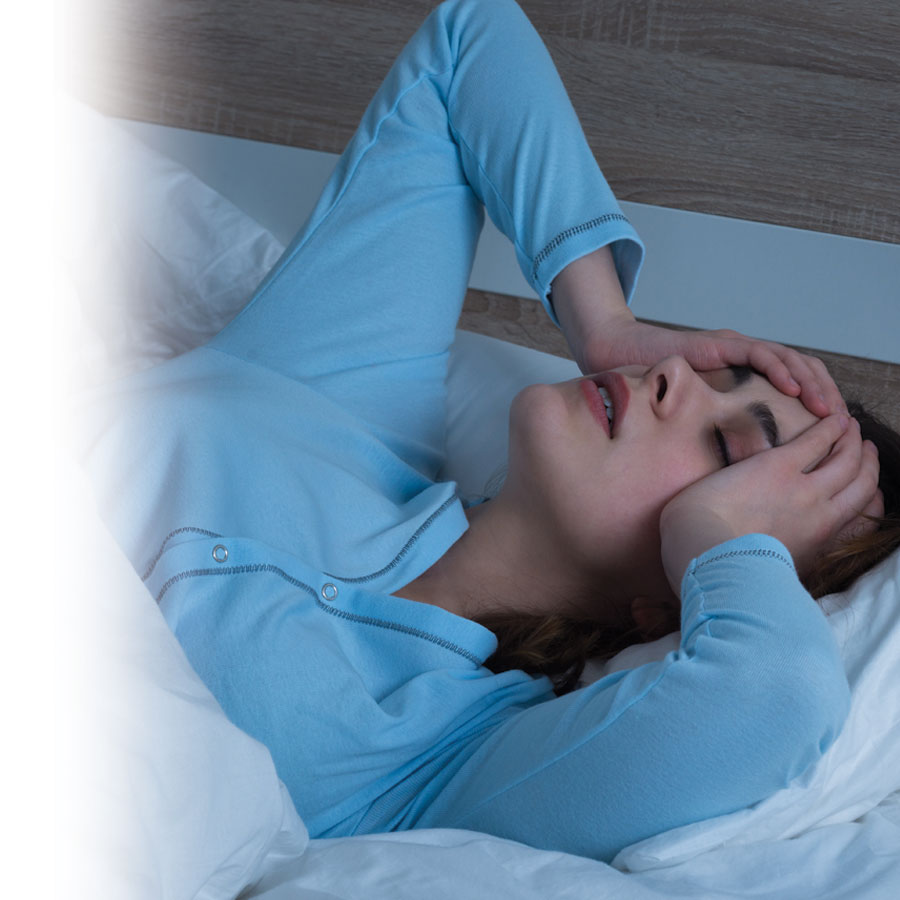Pain can disrupt sleep. In contrast, sleep is essential to effectively control pain. How can this situation, which can become a vicious cycle, be resolved?
Pain and insomnia, a difficult co-existence
Most people who live with chronic pain complain of insomnia or sleep that is not restorative. Poor sleep quality negatively affects pain management. Unfortunately, a bad night’s sleep is likely to be followed by a recrudescence of pain during the day. This vicious cycle is often difficult to break. Studies show that a lack of sleep hampers the healing process. It may also affect the immune system and increase sensitivity to pain. Consequently, to control pain, it is important to sleep well, and to sleep well, pain must be adequately relieved. How do you strike a balance between the two?
Promote sleep and prevent insomnia
Insomnia may be caused by something other than pain itself. It can be attributed to various health problems, such as anxiety, depression and certain thyroid problems. Some medications may also disrupt sleep. If sleep problems occur after starting new medication, speak to your pharmacist promptly. If you have recently begun to have insomnia and it is becoming more frequent, don’t hesitate to speak to a healthcare professional.
What should you do until you can be seen by a doctor?
When you see your doctor, they will need as much information as possible regarding your insomnia episodes. In order to identify the problem, you can keep a sleep journal each morning for about two weeks.
Here is the information that should be kept in the journal:
- Time needed to fall asleep.
- Duration of sleep.
- Number of times you awoke.
- Energy level during the day.
- Whether or not you used a sleeping aid (prescribed or over-the-counter, including natural products).
- Time you went to bed and time you awoke.
- Assess your sleep quality by assigning it a score from 1 to 10 (10 being excellent).
Some tips to promote sleep
- Go to bed and wake up at the same hour every day.
- Avoid naps during the day.
- Limit your consumption of caffeine (tea, coffee, energy drinks, and certain soft drinks) during the day, and stop drinking them at least four hours before bedtime.
- Avoid drinking alcohol late at night, as this can cause you to awaken during the night.
- Avoid smoking at night and in the hour preceding bedtime.
- Use the bedroom to sleep and for sexual intercourse.
- Do not remain in bed if you are unable to sleep (it is preferable to get up).
- Avoid screens (tablets, smartphones, and video games) before bedtime.
- Establish a relaxing bedtime routine.
- Make sure your bedroom is comfortable (temperature, lighting, noise).
Exercise and sleep
It has been proven that exercise benefits sleep quality. However, it is recommended to avoid intense physical activity three hours before you go to bed.
To better relieve pain
Since pain relief and sleep quality may be closely connected, it is also advisable to assign a score to pain and to relief. A pain journal will help your healthcare professional to find the right solutions.
Here is the information that should be kept in a pain journal:
- Note the pain level at various times during the day (from 1 to 10, 10 being the worst pain ever felt).
- Note the activities you did before the onset of pain.
- Note the medication that was used to ease the pain, and the dose and time it was taken.
- You can also assess the relief it provided (with a score between 1 and 10).
- If you experience side effects after taking medication, write them down, so you can discuss them with your doctor.
Don’t forget
Pain can be treated using various mechanisms, depending on its origin or cause. If you are unable to get relief, don’t hesitate to speak to your pharmacist or doctor. If you are prescribed a drug treatment, be sure to take it as prescribed. Speak to your doctor or pharmacist if you experience side effects, as they are usually manageable.
Pain and insomnia can be warning signs. It is important to report insomnia or pain that is not relieved to your doctor or pharmacist.

